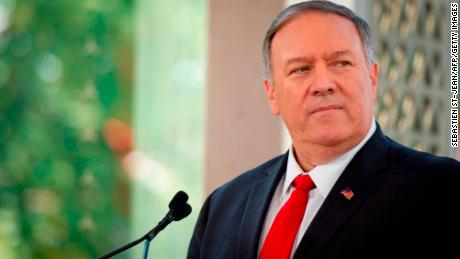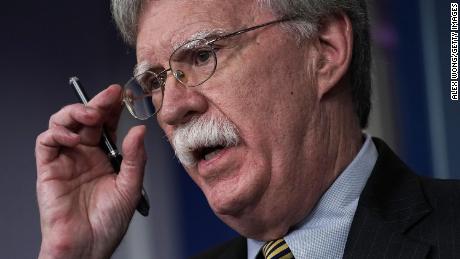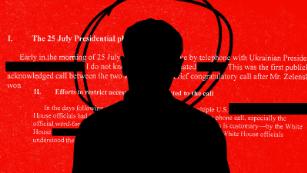What's missing from the Democrats' case against Trump
A version of this story first appeared in CNN's Impeachment Watch newsletter. To get it in your inbox, sign up for free here.
We saw two weeks of fact witnesses, mostly civil servants -- many of whom have worked for Presidents of both parties, and who are currently or were recently serving proudly under President Donald Trump -- confirm the basic storyline laid out in August by the whistleblower. It is this: Trump tried to thwart the will of Congress and use taxpayer dollars as leverage to get a foreign leader to hurt a political rival.
The hours of testimony were best summed up by British-born Russia expert Fiona Hill, who said Thursday that the President replaced national security foreign policy with a "domestic political errand" -- a move that has left the US exposed to further Russian interference in its democratic process.
There have been 12 public witnesses. Here's the key element each one offered:
Bill Taylor, the top official at the US Embassy in Ukraine, brought the accusations to life as he described how he came to realize over the summer that Ukrainians were being pressured to announce investigations that involved baseless allegations of Ukrainian influence in 2016 and, separately, Burisma, the company that employed Hunter Biden. He put his concerns in writing. Read his opening statement here.
George Kent, the top official for Eurasia policy at the State Department, talked about how Trump's decision to deputize his personal lawyer Rudy Giuliani as his policy proxy amounted to an end run around the State Department and led to the smear campaign against now-former Ambassador Marie Yovanovitch. Read his opening statement here.
Marie Yovanovitch talked about how Giuliani spread conspiracy theories at a time when the new Ukrainian government headed by Volodymyr Zelensky needed support from the US -- and how intimidated she felt. Read her opening statement here.
Alexander Vindman talked about hearing Trump pressure Zelensky and immediately raising concerns. He talked about how those concerns went nowhere even though they built on previous concerns he had raised after a confrontational meeting with Gordon Sondland at the White House. Read his opening remarks here.
Jennifer Williams, who was also on the July 25 call, confirmed she thought it was unusual and more political than a call between the President and another world leader would normally be. Read her opening remarks here.
Kurt Volker, the former special envoy for Ukraine, said he didn't realize that Trump's request that Burisma be investigated was the same as investigating the Bidens until he read the transcript of the July 25 call when it was released in September. If he had known, he would have raised his own objections, he said. Read his opening remarks here.
Tim Morrison, who succeeded Hill as the White House's Russia expert, didn't see a problem with the call, but he knew it would be a problem if it became public. He was right. He knew investigating Burisma was code for investigating the Bidens because he Googled it. Read his opening remarks here.
Gordon Sondland, the US ambassador to the EU and a Trump donor, said yes, there was quid pro quo and that everyone at the top of the Trump administration was "in the know." He also said if he'd known that investigating the Bidens was the same as investigating Burisma, he would have raised his own concerns. Read his opening remarks here.
Laura Cooper, a Pentagon official, talked about how freezing the Ukraine aid confused and alarmed Defense officials in mid-July and also how Ukrainians may have known the aid was frozen by the time Trump talked to Zelensky on the phone. Read her earlier testimony here.
David Hale, a top State Department official, said Yovanovitch was a good ambassador and that what happened to her was wrong. Read his earlier testimony here.
Fiona Hill, the former Russia expert at the White House, distilled the whole thing into what it was -- a domestic political errand rather than a genuine foreign policy. And she deconstructed Trump's fiction that Ukraine was out to get him in 2016. Read her opening remarks here.
David Holmes, the Ukraine embassy official, tied Trump directly to the desire for investigations. Read his opening remarks here.
With those facts, Democrats hope Americans will understand that Trump was holding the promise of tax dollars -- and more broadly, US support -- over Zelensky's head to make him investigate the Bidens. They'll say that's bribery or some other high crime and misdemeanor.

What is Pompeo's role in the Ukraine scandal?
People I'd still like to hear testify
Democrats were only able to present half the story. The White House made the decision not to cooperate, so we haven't seen key documents and we haven't heard key testimony. We likely won't hear Trump's side until or unless Trump is impeached and this moves to a full trial in the Senate.
Here are some people we should probably hear from but who aren't talking:
- Vice President Mike Pence -- What did he say when he met Zelensky on September 1 and Zelensky asked for the military aid? How did Pence justify the holdup?
- Secretary of State Mike Pompeo -- He's the boss of many of the witnesses who testified. He was on the call between Trump and Zelensky. Sondland says he was in the know. He got a first-person plea from Bill Taylor to act. But he's stayed quiet. Now Trump is suggesting he should go home to Kansas and run for Senate.
- John Bolton -- He said Giuliani's shadow foreign policy was like a "drug deal." He met with Trump regarding Ukraine. He offered his resignation on the day this all blew up. More on him later.
- Acting White House chief of staff Mick Mulvaney -- He's already said there were conditions on Ukraine before they could get funding. Tell us more and do it under oath. When did Trump decide to hold the aid and how was that transmitted to the Ukrainians?
- Acting OMB Director Russell Vought -- He can tell us more about exactly how and when the money Congress allocated for Ukraine got held up.
- Attorney General William Barr -- What, if any, were his directions from Trump regarding Burisma and the Bidens?
- John Eisenberg -- The NSC attorney who fielded complaints from Hill and Vindman can also explain why he took the unusual step of putting the July 25 call transcript in an extra-secure server.
- Sen. Ron Johnson -- He talked to Trump about the Ukraine aid and he met with Zelensky during the critical period.
- Energy Secretary Rick Perry -- The only one of the so-called "Three Amigos" -- Perry, Sondland and Volker -- who has not testified. He met with Zelensky and gave him an approved list of natural gas advisers.
- Rudy Giuliani -- He's almost unnecessary since he's talked so much about all of this, but he needs to be put on the record and under oath.
- The whistleblower -- Yes, the whistleblower has a right under the law to anonymity. But at this point, so many other people have come forward publicly. It would complete the puzzle to hear the missing account of how the whispers in West Wing became a formal complaint.
Two big GOP theories take a hit
One: CNN's Zachary Cohen reports that US intelligence officials told senators and their aides in a classified briefing this fall that Russia has engaged in a years-long campaign to shift the blame away from Moscow and onto Ukraine for interfering in the 2016 American presidential campaign, according to two US officials familiar with the briefing. House GOP members have continued to insist they believe that Ukraine interfered in the 2016 election, despite hours of testimony to the contrary. More on that here from Manu Raju and Jeremy Herb.
Two: One of Trump's frequent claims about the Russia investigation is that his campaign was spied on by the Obama administration. Finally, a long-awaited report into the origins of that investigation is nigh, and it's not expected to back up Trump's position.
The Department of Justice Inspector General's report on the start of FBI's investigation into Russian interference in the 2016 election will say the probe was properly launched but lower-level employees made a series of mistakes.
The investigation on the effort to obtain warrants under the Foreign Intelligence Surveillance Act on Carter Page, a former foreign policy adviser to the Trump campaign, is expected to conclude that the FBI's so-called "Crossfire Hurricane" investigation -- which became the Russia investigation -- was properly predicated, and that there were a series of mistakes and improper handling of the Page FISA application by lower-level employees.
The New York Times was first to report on the expected conclusion of the report.
Trump's reply: There are Trumpers and there are 'never-Trumpers.' That's it.
The President of the United States called in to Fox News on Friday morning and spent almost an hour responding to the impeachment hearings and complaining about the process. Here's CNN's rundown of the 18 false claims he made in the interview.
One quote in particular struck me, since he seemed to imply that anyone in government before he took office is a "never Trumper." This is a patently ridiculous allegation, but it was a window into his paranoia about the loyalty of the people serving in the government he leads.
It's not about Republicans or Democrats for the President. It's about Trumpers and never Trumpers.
"Again I don't even know these people," he said. "You know I come to Washington, so you've had Bush and you have never-Trumpers and you have Bush, you have Clinton, you have Obama. So you have 24 years of people in positions, right? Then I come in with no experience, which is the good thing but I know life and I come in and I end up with thousands of people that are never-Trumpers."
I talked about this on the Impeachment Watch podcast with Lisa Monaco, a CNN analyst who was homeland security and counterterrorism adviser to President Obama and also Marshall Cohen, who maintains CNN's Impeachment Tracker.
This is a new GOP
"Two weeks of impeachment hearings have revealed as much about the Republican Party as they did about the President's actions toward Ukraine," writes the presidential historian Julian Zelizer. Read this.
"As I have argued before, President Trump did not change the Republican Party. He is a product of a new GOP. But what the President exposes is how much the GOP has changed: how the pursuit of partisan power now overwhelms almost any concern for norms, governance and, to some extent, national security."
"... Rather than having a debate about whether the President's actions were impeachable, Republicans instead treated the nation to a week of wild-eyed accusations that simply pushed aside the alarming reality that credible witnesses — public servants all — laid before them."

Bolton: White House attached software to my Twitter account
Just talk already, John Bolton
Everyone else is thinking about impeaching the President of the United States and John Bolton is playing games on Twitter. Gain some perspective, sir.
Nothing with John Bolton is ever simple. But this is a new level of manufactured drama.
Bolton knows how Washington works better than almost anyone. He's been in and out of government since the Reagan era. He emerged on Twitter after a two-month hiatus, saying that he had gotten his social media back after being blocked for months by the White House.
Great. Everyone wants to know what he has to say about Trump and Ukraine. After all, he claims to have offered to resign on the very day everything blew up -- when the inspector general for the intelligence community told Congress about the whistleblower and when Bill Taylor was warning against holding up Ukrainian aid in exchange for investigations.
Trump's Ukraine scandal: Who's who?
Why oh why must Bolton bring the drama? Presumably, he wants a court to compel him to testify so he's not violating his own dedication to executive privilege. (Also, he's working on a book.)
Late Friday, CNN reporters caught Bolton as he arrived at Union Station from New York. When asked whether the White House was blocking him from testifying in the impeachment inquiry, Bolton said, "I don't know, you'll have to ask the White House." He was also asked whether he was in conversations with the House. "I have no comment on any of that," he replied.
Just spill the freakin' beans already. It's only the future of the country we're talking about here.
Biden weighs in -- to defend his son
"I am disappointed, and quite frankly I'm angered, by the fact -- he knows me; he knows my son; he knows there's nothing to this," Biden said of his former Senate colleague Sen. Lindsay Graham, who is Trump's top defender. "Trump is now essentially holding power over him that even the Ukrainians wouldn't yield to."
What's next: A working holiday
There's a lot for Democrats to do if they want to impeach Trump this year (they do). Here's what comes next, from CNN's Manu Raju and Jeremy Herb: They're going to be writing a report based on the fact witnesses, beginning to write the articles of impeachment even, planning a series of hearings in the Judiciary Committee to explain the process and allowing the White House and the Intelligence Committee, among others, to present their case.
What are we doing here?
The President has invited foreign powers to interfere in the US presidential election. Democrats want to impeach him for it. It is a crossroads for the American system of government as the President tries to change what's acceptable for US politicians. This newsletter will focus on this consequential moment in US history.
Keep track of congressional action with CNN's Impeachment Tracker. See a timeline of events here. And get your full refresher on who's who in this drama here.
News Courtesy: www.newagebd.net












